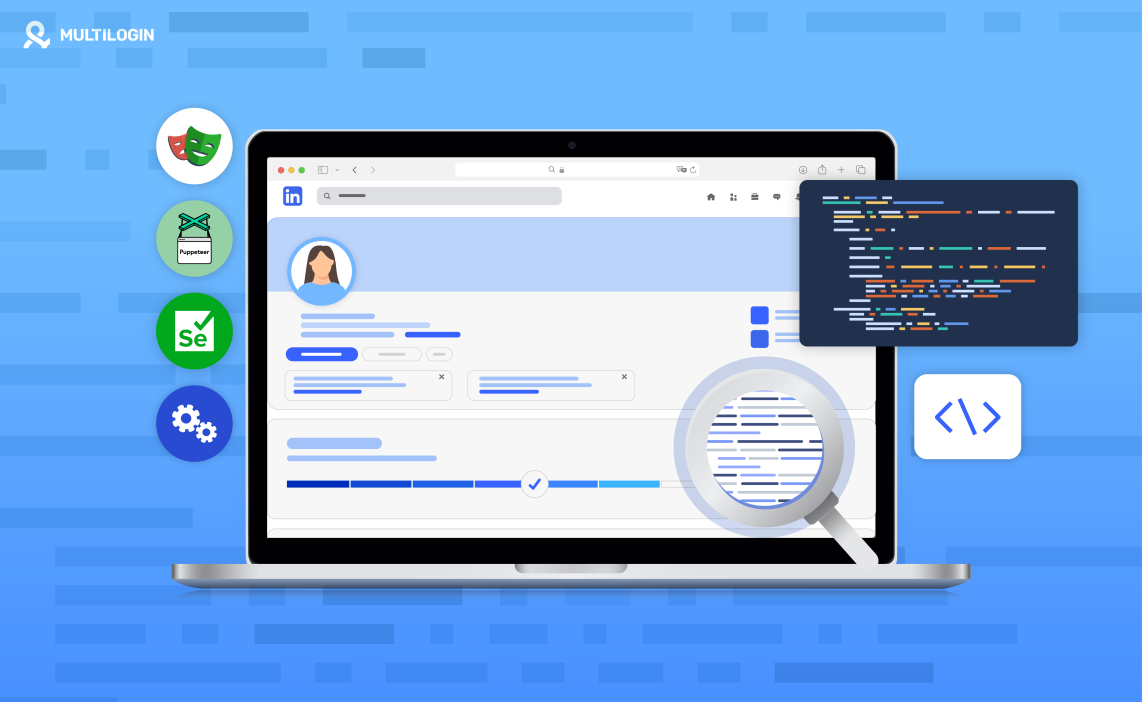Web scraping is an essential tool used by various businesses to succeed. Getting insights into customer behaviour, market research and analysis are a few benefits of data extraction.
Getting started with web scraping requires using different tools. Free open-source web scraping tools unite all the necessary features and functionalities that are needed for a convenient and successful scraping journey.
In this article, we will show you the best free open-source web scraping tools and explore the importance of using them.
What are Open-Source Web Scraping Tools?
Open-source web scraping tools are software applications or libraries that help users to gather data from various websites. They are made available under open-source licenses which means that developers can modify and enhance the software freely.
Open-source web scraper’s source code is publicly available. They often offer features like managing requests, processing data, etc. Using these tools allow users to efficiently scrape data.
Open-source web scraping tools enables users to automate the process of collecting information from various sources. This data can be used for analysis, research, etc.
Advantages of Using Free Open-Source Web Scraping Tools
Open-source web scraping tools are widely used by scrapers as they are effective for both small and large-scale projects. Here are several reasons why you should use them:
1. Cost-Effectiveness
Most of the open-source web scraping tools are free. This makes them accessible for everyone. These tools can be used by different businesses or individuals as well.
2. Flexibility
Open-source tools allow users to modify the source code to make sure it meets their specific needs and preferences. Customization makes it easier to scrape effectively.
3. Transparency
As the code is open, users can inspect it for bugs. This process fosters trust and accountability.
4. Advanced Features
Open-source web scraping tools have different useful features. Built-in features handle various tasks like parsing, data storage, and automation.
5. Handling Data
Most of the open-source web scraping tools are designed for handling large volumes. This ability will help you to improve your experience and scrape data effectively.
6. Community Support
Popular open-source web scraping tools have large communities. Community support is essential as it can offer tutorials and contribute continuous development.
7. Regular Updates
Free open-source web scraping tools are often updated. This way users can benefit from new features and enhance their scraping experience.
8. Scalability
Some of the open-source web scraping tools can handle large projects. Scraping large amounts of data can enhance the effectiveness of the extraction process.
Using free open-source web scraping tools are essential to maximize the effectiveness of web scraping. Getting insights into user behaviour, collecting data allows you to scale your business.
Key Features of Free Open-Source Web Scraping Tools
Free open-source web scraping tools have many different features. They enable users to make web scraping process more convenient.
Here are some key features you must look for in free open-source web scraping tools:
Flexibility
Using free open-source web scraping tools allows users to modify the source code. It is beneficial as users can customize the code to fit their specific needs.
Customization allows you to define how data is processed and stored after the scraping process. This feature is important for convenient data extraction experience.
Language Support
Free open-source web scraping tools support various programming languages including Python, Java, etc.
Built-In Features
Support for HTML and XML parsing allows users to easily extract data from different websites.
Proxy Management
Tools with the options for using proxies are very helpful as it protects users from IP bans. One more benefit of this feature is that it enables users to access geo-restricted content.
Handling Dynamic Content
Most of the free open-source web scraping tools can handle dynamic content. It is very useful to extract data efficiently.
Support for Exporting Data
Free open-source web scraping tools support for exporting data in various formats. These formats include CSV, JSON, database, etc. Using formats is helpful to analyse the data better.
Documentation and Community
Large communities and forums are helpful for troubleshooting, updates and support. Guides and tutorials can help users to explore how open-source web scraping tools work.
You must consider these key features while choosing the tool you will use. Making the right choice must be based on your preferences.

Best 6 Free Open-Source Web Scraping Tools
There are many free web scraping tools available. In this article, we will discuss about top 6 tools and explore their pros and cons.
Here are top 6 free open-source web scraping tools:
Playwright
Playwright is an open-source automation library. It is used for browser testing and web scraping. Playwright has a headless mode which is helpful to automate tasks and mimic human behaviour during scraping.
Pros:
- Supporting multiple browsers, including Chrome, Firefox, Safari
- Headless mode
- Offers a comprehensive API to interact with web pages
- Easily integrates with other tools
Cons:
- Improperly configured scripts can lead to missed data if the elements are not waited on
Selenium
Selenium is one of the most popular open-source frameworks. It is mostly used for extracting data from websites that rely on JavaScript. Selenium can handle dynamic content.
Pros:
- Supporting multiple browsers
- Supporting several programming languages like Java, Python, etc.
- Helpful documentation for troubleshooting
- Headless mode
Cons:
- Setting up the Selenium environment can be complex
Puppeteer
Puppeteer is an open-source Node.js library. It allows users to scrape different websites efficiently, automate testing, etc. It can generate PDF files from web pages, which can be useful for reporting or documentation.
Pros:
- Automatic waiting feature for elements to be ready before interacting
- Regular updates
- Headless mode for automating tasks
- Ideal for scraping dynamic websites
Cons:
- To use Puppeteer, you must be familiar with JavaScript, which limits its accessibility for people using other programming languages
Beautiful Soup
One of the most popular open-source tools is Beautiful Soup. It is a Python library that provides necessary tools to scrape data effectively. Beautiful Soup supports various methods for searching and filtering elements.
Pros:
- User-friendly, easy for beginners to learn
- Supporting multiple parsers
- Ideal for medium-sized scraping projects
- Extracted data can be converted into different structures
Cons:
- Less suitable for large-scale scraping projects
Scrapy
Scrapy is a free open-source web scraping tool for Python. It is especially essential and helpful with large-scale scraping projects. Scrapy provides built-in features for handling requests and responses, data cleaning, etc.
Pros:
- Highly customizable
- Ideal for large-scale scraping tasks
- Large community and helpful documentation
- Easy to use
Cons:
- Set up process can be more complex compared to other tools
Heritrix
Heritrix is a Java-based open-source web scraping tool. It supports storing data in various formats and allows users to efficiently scrape large websites.
Pros:
- Handles large-scale projects
- Helpful documentation
- Web-based interface
- Comprehensive data capture
Cons:
Set up requires good understanding of its settings and can be complex for beginners
Choosing the right tool requires exploring different platforms, identifying your needs. If you want to choose the best free open-source web scraping tool, you must make sure that the tool meets your preferences.
Using the best web scraping tools for your needs is essential for making your scraping activities more convenient.
How to Use a Free Open-Source Web Scraping Tool
Using a free open-source web scraping tool is a cost-efficient way to collect data. It can be useful for automating the process of gathering information. Here is a guide to use a free open-source web scraping tool:
Step 1: Choose the Tool
Decide which tool fits your needs and preferences the best. Search for available information about them, read customer feedback, etc.
Step 2: Set Up the Environment
After choosing the tool, you must install your chosen programming language and required libraries.
Step 3: Write the Scraping Code
After installing all necessary tools, you must write the scraping code to start scraping.
Step 4: Pay attention to the Legal Part
You must check the website’s robots.txt file and make sure that the scraping process is permitted. Remember to respect the site’s terms of service to avoid any threats.
Step 5: Store Your Gathered Data
You must think about the strategy you will use to store your data. It will help you to effectively analyse gathered information and enhance your marketing strategy.
Challenges of Using Free Open-Source Web Scraping Tools
Using open-source web scraping tools is very important and helpful. However, there are many challenges people face when using free open-source web scraping tools, including:
Site Structure Changes
Websites often change their layout and structure, which can lead to breaking scraping scripts. It is important to frequently update the code to adapt to these changes.
Data Accuracy
People using free open-source web scraping tools must make sure that the gathered data is accurate. Sometimes these tools struggle to extract clean and reliable information. This process can be challenging for users.
Performance Issues
Before choosing the tool, you must check whether it can handle large-scale tasks or not. Sometimes free open-source web scraping tools are not able to handle data efficiently which leads to slow performance.
Getting Banned and Rate Limiting
Sending too many requests to a website can trigger rate limiting. You must try to manage the frequency of requests to avoid it.
It is also important to note that web scraping can be detected, and frequent requests can cause IP blocking. People use different techniques to bypass anti-bot protection.
Lack of Documentation
In some cases, free open-source web scraping tools may not offer a comprehensive documentation. Beginners might struggle to understand the tool without it. Lack of documentation can make troubleshooting issues difficult.
Data Privacy
One of the common challenges of web scraping is handling data. Scraping large amounts of data can lead to privacy issues. Users must be very cautious while scraping any type of personal or sensitive information. It is important to use free open-source web scraping tools responsibly.
These challenges require paying attention to detail, engaging with communities to learn from their experiences. Understanding the complex side of web scraping will help users better prepare for data extraction processes.
Multilogin as an Essential Tool for Web Scraping
As mentioned above, one of the challenges people face while using open-source web scraping tools is getting banned and rate limiting. To avoid these problems, you must use an anti-detect browser like Multilogin.
Multilogin is a tool which allows users to scrape websites without hitting rate limits. With the help of Multilogin you can create multiple accounts and gather large amount of data.
Multilogin allows users to mask or alter their digital fingerprints and mimics human behaviour. This way, it becomes harder for websites to detect web scraping process. You can avoid problems like CAPTCHAs, IP bans just by using this anti-detect browser!
Also keep in mind that Multilogin can help you to automate data extraction with tools like Selenium, Playwright and Puppeteer.
Multilogin provides residential proxies to avoid detection. It makes the web scraping processes more efficient and protects users from being flagged.
Frequently Asked Questions About Free Open-Source Web Scraping Tools
What is an open-source web scraper?
An open-source web scraper is a tool for extracting data from various websites. Its source code is made publicly available.
Does open-source mean free?
No, open-source does not always mean free even though most of open-source projects are free. It means that the source code is available for everyone to use and modify.
Can websites detect web scraping?
Yes, websites can detect the scraping process. They use various strategies to discover it.
Why is it important to use open-source web scraping tools?
There are several reasons why it is important to use open-source web scraping tools. It is essential for transparency, flexibility, scalability, etc.
What are the best free open-source web scraping tools?
Some of the best free open-source web scraping tools are Selenium, Playwright, Puppeteer, Scrapy and Heritrix. To choose the right tool, you must consider key features and your needs.
How can I use free open-source web scraping tools?
To use free open-source web scraping tools, you must choose the tool first. After setting up the environment you can write the scraping code and start gathering data. Remember to pay attention to the legal part and store collected information safely.
Conclusion
Free open-source web scraping tools play a huge role in the success of different businesses. It allows companies to scrape data efficiently. They are cost-effective and highly customized at the same time.
However, there are many challenges people face while using them. Being aware of these challenges is essential to mitigate risks like performance issues, legal and ethical issues, etc. You must stay updated and understand the importance of avoiding the challenges to scrape efficiently.


